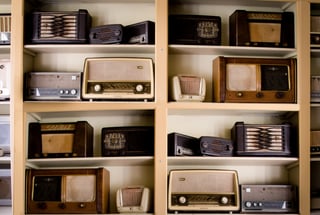
Recently, one of our newest communities was featured in the news! The residents at Antebellum on Arlington (formerly Blair House) in Macon, Georgia were given a special treat recently when a local church donated new iPods and iTunes gift cards to the community.
Each resident recipient was part of the Memory Care program, and the donations were inspired by a documentary about music and memory.
Watch the video above (via WMAZ) and click here to read the entire article.
We did a little more research on the topic--keep reading to find out what we've learned!
On Music Therapy
 There are multiple resources to be found about Music Therapy and its benefits in relation to people diagnosed with Alzheimer's or another form of dementia. A Place for Mom, which was created to help families navigate the maze of senior living options, published an article about Music Therapy.
There are multiple resources to be found about Music Therapy and its benefits in relation to people diagnosed with Alzheimer's or another form of dementia. A Place for Mom, which was created to help families navigate the maze of senior living options, published an article about Music Therapy.
The article states that "how the brain and body process music remains mysterious." The significance of a specific piece of music to an individual can vary person to person, so there is no blanket approach to how to treat someone with music. Some patients react better to passive therapy, which involves listening to live or recorded music. Other benefit from the active therapy of physically creating music.
Disclaimer: there has not been enough scientific evidence to medically prove the benefits of Music Therapy. However, there has also NOT been evidence that exposing those with dementia-related illness to music is a bad thing.
Click here to check out the article by A Place for Mom for more in depth information about this topic.
Alzheimers.net provides another interesting read: 5 Reasons Why Music Boosts Brain Activity.
 Communicating Through Music
Communicating Through Music
Sometimes, music can be a way to connect when verbal communication is difficult or impossible. The Alzheimer's Association gives tips on how to connect musically with someone who has dementia. These steps include: identifying music that is enjoyable to the person, avoiding interruptions or other noises that may cause a sensory overload with the person, and encouraging movement while listening to the music.
Click here to learn more about these steps and for other resources related to this topic.
For another resource, the Alzheimer's Foundation of America (AFA) breaks down recommendations based on which stage (early stage, early and middle stages, middle stage, and late stage) of the disease the person is in. While the above link gives a broad approach, this resource breaks it down a little further.
If you wonder about how music might benefit your loved one, we would love to sit down with you and talk about your unique situation. Contact your nearest community so we can help find the best option for you!

 Communicating Through Music
Communicating Through Music

